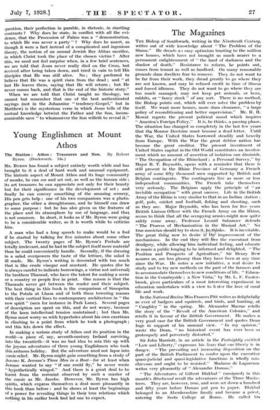Young Englishmen at Mount Athos
The Station : Athos : Treasures and Men. By Robert Byron. (Duckworth. 18s.) MR. BYRON has found a subject entirely worth while and has brought to it a deal of hard work and unusual equipment. The historic aspect of Mount Athos and its huge community of monks, he can see and set out, as well as the human side ; its art treasures he can appreciate not only for their beauty but for their significance in the development of art ; and finally he can convey something of the amazing scenery. His pen gets help : one of his two companions was a photo- grapher, the other a draughtsman, and he himself can draw to some purpose : but he has also given us the features of the place and its atmosphere by use of language, and that is not common. In short, it looks as if Mr. Byron were going to be a considerable writer, so it is worth while to criticize him.
A man who had a long speech to make would be a fool if he started by talking for five minutes about some other subject. The twenty pages of Mr. Byron's Prelude are totally irrelevant, and he had in the subject itself more material than he could conveniently handle. Secondly, if the dressing in a salad overpowers the taste of the lettuce, the salad is ill made. Mr. Byron's writing is decorated with too much that is like crude vinegar and mustard. He quotes (for he is always careful to indicate borrowings, a virtue not universal) the brothers Tharaud, who have the talent for making a scene or a country or people live in print. One reason is that the Tharauds never get between the reader and their subject. The best thing in this book is the comparison of Simopetra to the Potala at Lhasa and of both these towering masses with their vertical lines to contemporary architecture in " the new spirit " (seen for instance in Park Lane). Several pages of description are spent on this, and do not weary, because of the keen intellectual tension maintained ; but then Mr. Byron must worry us with hyperboles about his own exertions in climbing to a point from which he took a photograph ; and this lets down the effect.
In making a serious study of Athos and its position in the worlda piece of, say, seventh-century Ireland surviving into the twentieth—it was no bad idea to mix this up with the joyous adventures of three young Englishmen who took this arduous holiday. But the adventure need not lapse into comic relief. Mr. Byron might gain something from a study of Jerome K. Jerome's Three Men in a Boat—for at least when Jerome wanted to say " if one could fly," he never wrote " hypothetically winied." And there is a great deal to be learnt from the restraint observed by such a master of the comic as Mr. Jacobs. However, Mr. Byron has high spirits, which express themselves a deal more pleasantly in this book than before : and he shows at least the beginnings of a power for revealing things in their true relations which nothing in his earlier book had led one to expect.












































 Previous page
Previous page